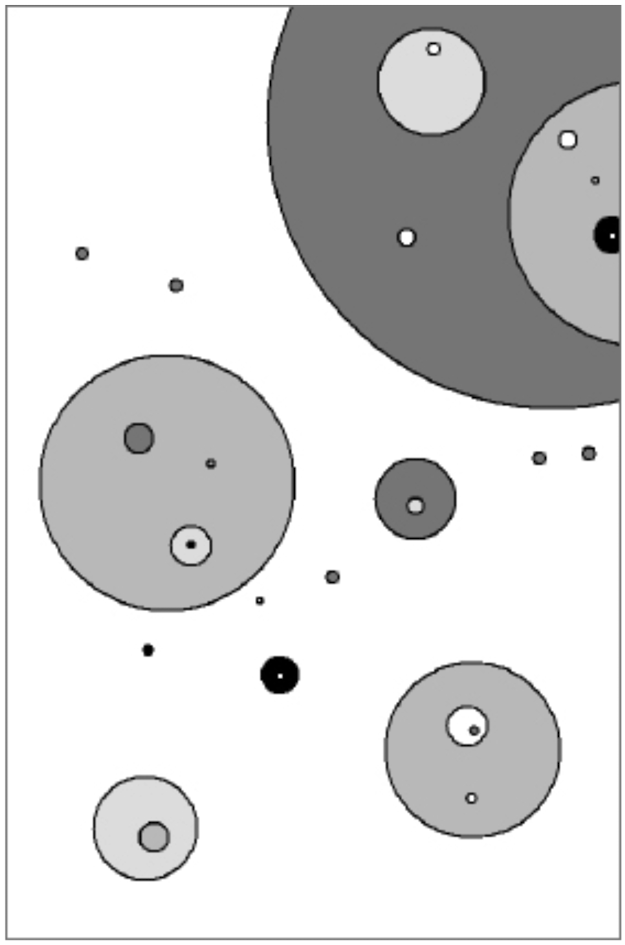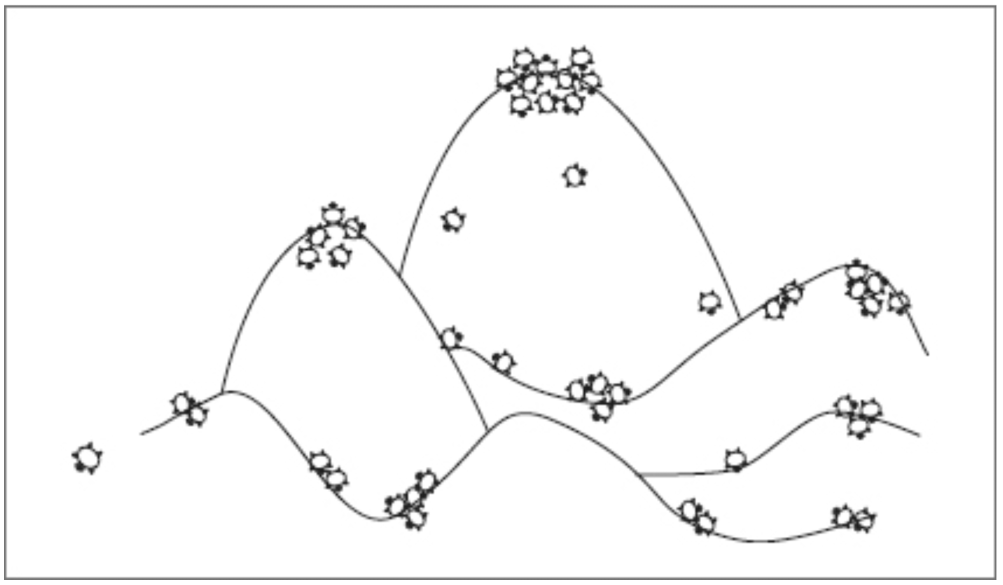“Your Highness, I have no need of this hypothesis.”—Pierre-Simon de Laplace (1749-1827), reply made to Napoléon when asked why his celestial mechanics had no mention of God
Link to original
Terminology (from Wikipedia)
- Observation selection effect
In cosmology, the anthropic principle, also known as the observation selection effect, is the proposition that the range of possible observations that could be made about the universe is limited by the fact that observations are only possible in the type of universe that is capable of developing observers in the first place. Proponents of the anthropic principle argue that it explains why the universe has the age and the fundamental physical constants necessary to accommodate intelligent life. If either had been significantly different, no one would have been around to make observations. Anthropic reasoning has been used to address the question as to why certain measured physical constants take the values that they do, rather than some other arbitrary values, and to explain a perception that the universe appears to be finely tuned for the existence of life.
- Anthropic?
The term anthropic in “anthropic principle” has been argued to be a misnomer… Nothing specifically human or anthropic is involved.
Definition: A landscape of possibilities populated by a megaverse of actualities
- Landscape: theoretical, a list representing possible environments (thermometer)
- Megaverse: real, filled with pocket universes shifting & growing
Assumptions
- The existence of life is delicate & requires exceptional conditions
- Possibilities of different laws of physics
- Existence beyond what we can observe directly
Limitations
- Should not expect to explain every feature of nature
VS tautology
- ≠ stating the obvious
- As shorthand for the existence of a fantastically rich Landscape and a mechanism for populating the landscape with pocket universes
- Analogy: only having evolved big brains can we ask why we evolved big brains (shorthand for laws permitting evolution & it having happened)
Apparent fine-tuning
- Age of the universe
- Rapid initial inflation + gentle subsequent expansion of billions of years
- Magnitude of gravity
- Strong enough to hold matter together in star & planet forms
- Weak so that some stars can burn for billion of years
- Diversity of elementary particles
- Allow the existence of building blocks to assemble into diverse molecules
- Necessary elements can be generated in stars & dispersed by supernovas
- 100+ constants of nature are unrelated - not simple, elegant, or fundamental
- Standard model: 30+ constants whose values have no justification
- Descriptive, but doesn’t explain itself (like overfitting)
- Incomplete, not special
- Cosmological constant
- Vacuum energy acts as source of gravity
- Observed value is tiny but not zero: gentle acceleration (age of universe
- Not too large: material spread out too fast, no atoms/galaxies
- Theorized from summing up the zero-point energies: 120 orders of magnitude bigger
- Arguably the biggest discrepancy between theory and observation in physics
- Not exactly zero: no growth of space
- Not negative: collapsed
- Not too large: material spread out too fast, no atoms/galaxies
- Canceling out
- Bosons (photons, gluons, Higgs) contributes positively
- Fermions (electrons, quarks, neutrinos) contributes negatively
- Supersymmetry = cancel out exactly
- Real world ≠ supersymmetric (no symmetrical particles found)
- Balance out in exactly the right proportions by masses, coupling constants that affect contributions
- Fine structure constant
- Electric force among charge particles
- Formation of atoms & molecules
- Higgs field
- Interaction gives electrons & quarks their mass
- Contain within the atom/molecule
- Density variation: 100000 times smaller than density
- Not too lumpy: black holes
- Not too smooth: not clumped at all
- Theoretical predicted - aligns with microwave intensity difference evidence
- From early random quantum fluctuations
- Excited carbon nucleus
- Excited state needed for carbon to form exists
- A few % higher/lower - carbons wouldn’t form
- The probability for the beryllium to capture a helium nucleus to produce carbon: expected to be low - seems arbitrary that it’s that
- Matter & antimatter
- 1 in 100000000 leftover of annihilated pairs
String theory
- Lack of uniqueness
- Many solutions to one theory
No experimental guidance
- Possible discoveries without experiments after 19th century
- Indivisible quanta - ultraviolet catastrophe
- Special theory of relativity - contradiction from observing light close to light speed
- General theory of relativity - reconciling the equivalence principle with special relativity
- Planetary structure of atom - guessed from spectroscopy before its discovery
- Antimatter - predicted from theory of electron spin & exclusion
- Protons - integer multiples of mass
- Neutrons - electric charge smaller than mass
- Gravitons ← gravitational waves ← general relativity
- Photons, gluons, Z-particles - predicted by 5+1D Yang Mills: photon-like
- String theory - closed strings behaved like gravitons (speculative)
- Good/bad ideas
- Infinite irrelevant, wrongheaded directions?
- Good produce more good, bad are dead ends
- Unforgiving math
- Ingenuity of experimental physicists
Landscape
- 10^500 valleys given by string theory
- Discretuum: discrete but almost a continuum
- Within many randomly chosen values for any constant
- A huge number of them would give rise to a habitable environment
- Despite them being only a tiny fraction
Bubble nucleation
- Metastable: stable for long periods but undergo sudden changes (supercooled liquids)
- Vacuums correspond to valley with particular energy densities - altitudes
- Quantum fluctuations continually create tiny bubbles of space (disappears) - neighboring valleys
- Lower altitude: bubble starts growing

- 1977 math describing bubble formation in inflating universe - Sidney Coleman
Space cloning
- Analogy
- Expanding shallow lake of supercooled water = space
- Boats carried along = matter
- Speed of surface waves = light speed
- Ice islands forming & expanding = alternate vacuum
- Where moves away faster than wave can travel = cosmic event horizon
- Inflation
- Starting with very large energy density
- Rapid exponential inflation (tilted plateau)
- Reheating: particles + heat (descent)
- Tiny vacuum energy, slow expansion (valley)

Populated landscape
- Bubbles nucleate with different properties
- Highest altitude = fastest reproducer - feed lower ones
- Exponentially increase
- Eventually many niches become populated

Analogy for the anthropic principle
- Intelligent fish evolved in medium-temperature water layer
- Different temperature, pressure, state - inhabitable
- Vast number of possible environment - window of habitability to allow water to be in liquid state
- Only in this case could fish exist to observe it - apparent coincidence, no design needed
Seeing beyond
- Large-scale density contrasts ← signatures from previous epoch
- Cosmic event horizon & blackhole event horizon
Challenges
Is life special?
- Copernican principle
In the absence of dogma and data, it is safer to be guided by the notion that we are not special, which is generally known as the Copernican principle,
Link to original
Is life chemically special? The Copernican principle suggests that it probably isn’t. Aliens need not look like us to resemble us in more fundamental ways. Consider that the four most common elements in the universe are hydrogen, helium, carbon, and oxygen. Helium is inert. So the three most abundant, chemically active ingredients in the cosmos are also the top three ingredients in life on Earth. For this reason, you can bet that if life is found on another planet, it will be made of a similar mix of elements. Conversely, if life on Earth were composed primarily of, for example, molybdenum, bismuth, and plutonium, then we would have excellent reason to suspect that we were something special in the universe.
Link to original